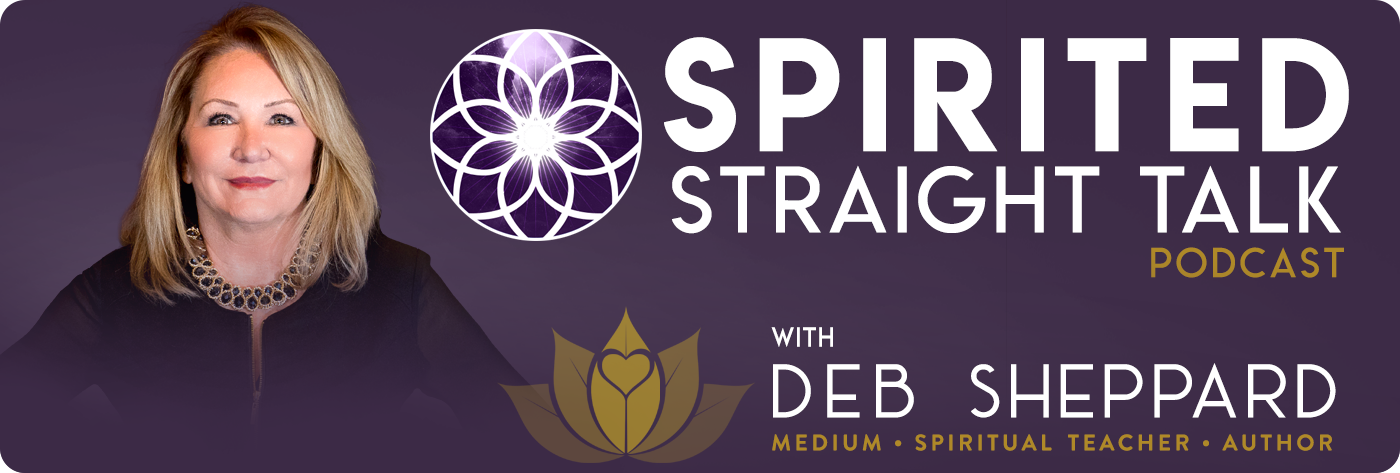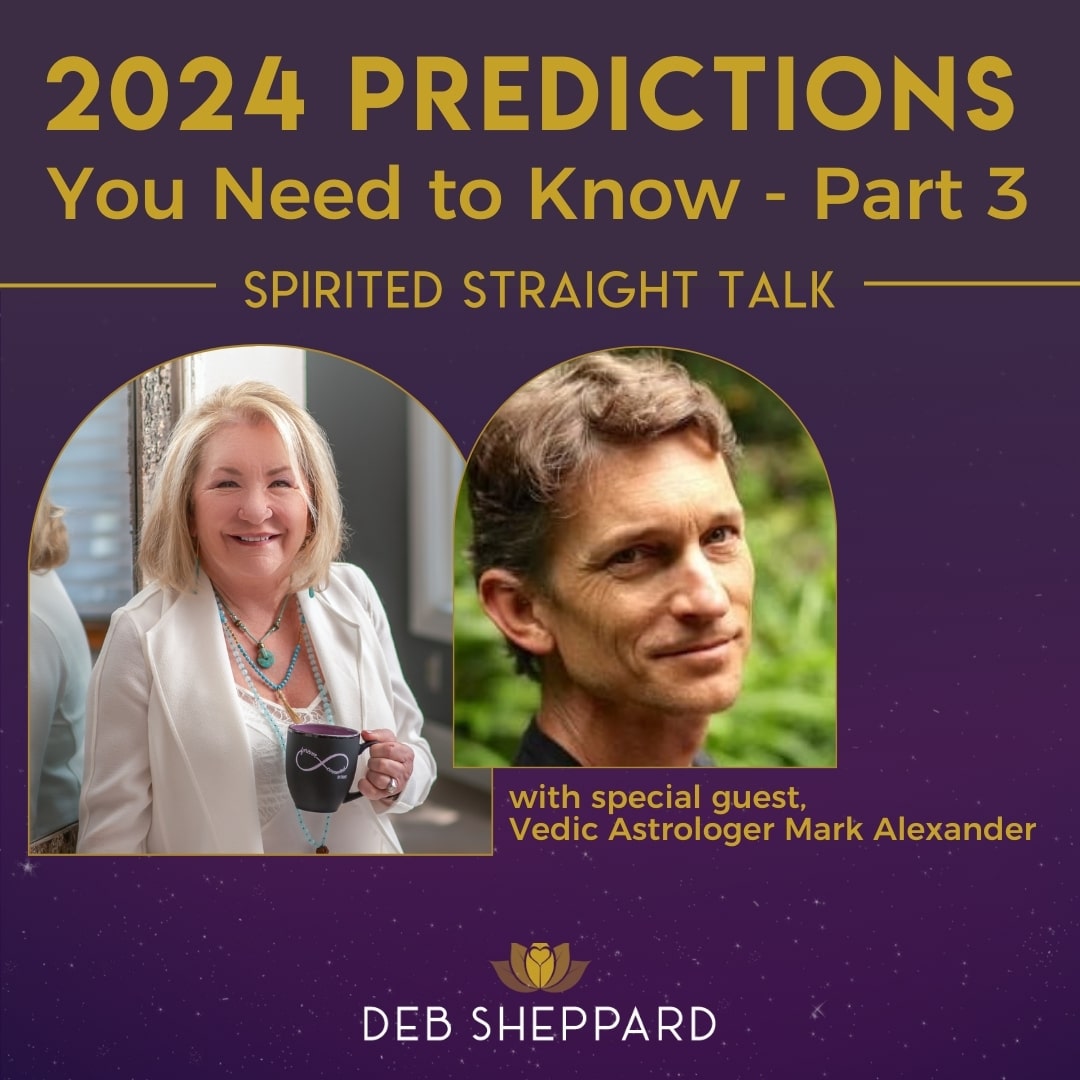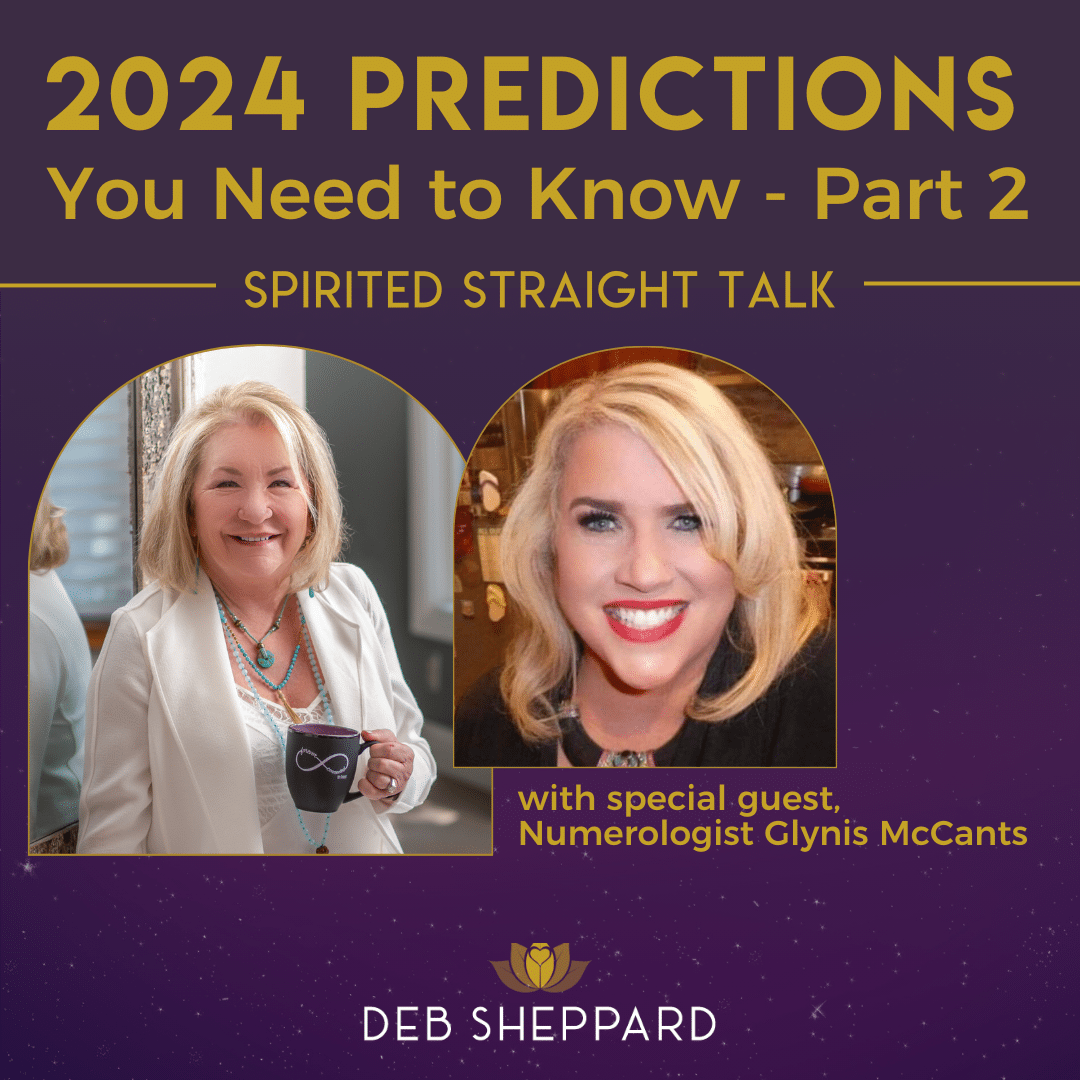
Stop Holding Onto Guilt, Pain and the Past
1 (6s):
Welcome to Spirited Straight Talk, the podcast to help you thrive with the help of spirit. I’m Deb Shepard, psychic, medium, spiritual teacher and author. Each week I bring new
2 (16s):
Insights
1 (17s):
To help you heal from loss, connect with spirit, and turned setbacks into triumphs. So let’s get started.
2 (26s):
How much time have you spent holding onto guilt? That is my topic today. I am here with Dana, my partner in crime, All things Deb, to help you be able to release guilt, heal, heal the, the energy around it, that vibration, and be able to have a life that you desire without all that heaviness that we do. As you know, Dana, that’s what people come to us a lot about. They feel guilty so many times that they, you know, weren’t there with their loved one when they passed. They didn’t communicate with them the way they wanted. There were things left unsaid and especially we, we know this, in suicide, there is so much guilt that would’ve could’ve should’ve regarding the, the loss of someone from suicide that they wish they would’ve known or had more.
2 (1m 12s):
So guilt is a huge emotion regarding first of all, the loss of a loved one. But we have it from early on in our life. We’re taught about guilt. You know, we’re told to be shamed and guilty even as children,
3 (1m 27s):
Especially if you’re Catholic or Jewish
2 (1m 30s):
Or, or like my religion, you have a
3 (1m 33s):
Yeah, they, they love
2 (1m 36s):
My parents are still doing it. Yeah.
3 (1m 37s):
They love to teach guilt as a way to keep you in line, which is fine. I mean it’s fine, but I think it, it also can be detrimental if it’s something you hang onto. Right?
2 (1m 48s):
Yeah. I think it’s something that it’s talked about but not talked about when someone needs to go through or once has a desire to go through their life and make changes. Many times when they have a lot of guilt in their past, they punish themselves and feel like they don’t deserve certain things in their life because, well, I did this or this is what happened to me, or this is what I did to somebody else.
3 (2m 13s):
I know. I’ve been through that a lot. Yeah, I’ve done that a lot.
2 (2m 16s):
And I mean, even this last couple weeks I know that I’ve been doing a lot of internal work and you do, you have this feeling of, wow, I hurt somebody or I didn’t mean to do that. And there’s a lot of people that apologize constantly in one, you know, one conversation overly much. And it’s learning that our understanding more than anything that we’re here to learn and guilt is if we look at guilt as a learning tool, that it provides an opportunity going, you know, I don’t wanna behave like that anymore. What is this really about? Where’s this anger from? Where’s this shame from? And what I of course teach in a lot of my classes about the limiting belief.
2 (2m 59s):
And I think guilt is a huge one that people, it’s almost as if it’s the elephant in the room where they don’t wanna talk about it. There’s a lot of shame and if we, we talk about it out loud, we’re worried about the judgment. So it never really gets healed or resolved a
3 (3m 15s):
Lot of us. Yeah, that’s an interesting take on it, that guilt can actually be a tool for you to work on.
2 (3m 23s):
Change yourself. Absolutely. And I think it’s also what I was thinking about this topic, if you actually do have guilt, it might be a reminder that you’re not a narcissist. So there could be a good value to that.
3 (3m 35s):
Yeah, that makes sense. Because
2 (3m 37s):
Pe anyone that doesn’t have any guilt or remorse about their behavior actions, things like that could mean that they have no empathy or compassion.
3 (3m 46s):
So what, what is your take on, because I heard this recently, I think actually Brene Brown said this, that, and I
2 (3m 55s):
Love her.
3 (3m 56s):
I know, I do too. I think that she shared that in her research, narcissism is more a person’s shame that drives the narcissist and that causes them to behave in that way. It’s almost like their shame is overwhelming and they can’t, so they behave away to eliminate that shame. So it’s almost like shame is the driving factor of narcissism.
2 (4m 28s):
Absolutely. And people love to control others by shame. Yes. As we talked about, certain types of dogma will do that, or in a partnership or in a job or certain situations where maybe a boss or coworker, a friend, a partner will make you feel like, Well I can’t believe you’re not doing that, or I can’t believe you said that. Or, Why aren’t you putting in more hours? So it’s can be used to manipulate. If you are using it to manipulate, you really have no shame. But for those that do have the guilt and feel remorse, it’s how do we shift that? Especially even guilt from years ago. And I think those things are really a challenge too.
2 (5m 8s):
So if you have guilt from 10, 20, 30, 40, whatever years ago, and we still bring that into our energy, it will affect so many things in our life. And what we talk about is the language of the universe. How do, how’s the law of attraction work? How do you create what you desire in your life? And I think the hardest thing, especially I see it more, well, I can see it in both sexes, but I see it a lot with women probably cuz I work with them more, is the fear of asking for help because they’re shaming guilt for asking for help as well. So when you put all those things together, a lot of us are limited to what we can create in our life because of our guilt of our past and how do we release it.
2 (5m 50s):
And that’s what our topic is today, is how do you shift that energy? You remember the previous podcast, it may have been a year ago, we called it energy coins, e
3 (5m 58s):
Energy as currency.
2 (6m 0s):
Yeah, as currency. And, and using equines as an understanding. If you are carrying around a lot of that shaming guilt, it will take so much energy from you that you are always protecting yourself. You’re, there’s a lot of fears happening. You are unable to actually tune in to your guides and then, and to really helping you in your everyday life because that’s pushing things down. And you will actually sometimes punish ourselves for this. I think a lot of people may not recognize this, but if you think about not receiving a compliment, not being able to have things coming to you on an easy way, people will feel guilt.
2 (6m 42s):
We even see it when if someone is struggling to find a a job and you have a successful career, there’s guilt around it. Well, I can’t talk about my success in my job because someone else is struggling. And so we carry that guilt even when we do have success. And it doesn’t mean we have to make the other person feel worse. Like, well I have a job, what’s wrong with you? Which is projecting that, but being okay and helping people understand that maybe the reason things aren’t positive for them is are they caring a lot of shame and guilt from their past. Yeah. And we see this and, and we’ve seen this happen so many times, especially in large groups where someone goes, I just wanna have a dream about my loved one coming through.
2 (7m 23s):
I wanna feel them. And when I say, Well, I feel like you’re carrying a little bit of residue, let’s say around their passing, there may be some guilt when they go into it. They go, Yeah, you’re right. There is still a piece of it. And the more that you can resolve that in which we’re gonna talk about and move forward, that’s gonna allow you to have that connection so much easier with your loved one or your guides, things like that. And it’s, it’s a big deal and I think all of us have worked around this topic, but I really like that we can give it some good direction.
3 (7m 59s):
So you have nine steps, right? Yeah. Is that what it is?
2 (8m 2s):
Is it like dancing? Can we count those on our, can we count those steps on our, you know, when we’re, when we’re walking? No, I guess not. I’m getting the look, you know, the shaming guilt. Look for Dana for those. That’s
3 (8m 14s):
The, Okay.
2 (8m 16s):
Those of you that know Dana know the look. Okay. So the intention here today is to help resolve and have a tool when, when you go into that place of guilt so that you know it’s not always hanging on you. And one of the things that I thought was really good is to the first one, the first one, right? Number one is to name your guilt. And I don’t think people do that. I don’t think we put an identity with it. And I know that when I look at this stuff and I’m like, okay, what is guilt
3 (8m 45s):
Name? Your
2 (8m 46s):
Guilt sounds like a game show, doesn’t it? Sorry. And come on down. Name your guilt. I think to name the guilt. I mean there’s so many layers to that. We think about, Oh, I forgot someone’s name. Well, my girlfriend yesterday was her birthday. This is one of my favorite people in the world I’ve known for years. And it came upon Facebook, of course it was her birthday. People were wishing that I thought, oh my goodness, I can’t believe I forget. Got her birthday. And it’s that naming of, oh, I have so much going on. Is that person important? Why would I not remember that person’s birthday? And we do, we go down what we call that rabbit hole when we are feeling that that shame,
3 (9m 25s):
So shame and guilt are
2 (9m 26s):
Very similar in my opinion. Align. Yeah. Because they’re, they’re very similar vibrations. The shame is, Oh my God, I can’t believe I did that. And then you feel guilty. I mean, that’s the emotion that comes with it. And we try to overcompensate sometimes for that energy. Like, okay, let me do something really big. So you know that I really didn’t mean to do that in those promises. So naming the guilt of being forgetful, how’s that person important? How would I forget to get to that appointment? All those things. I’m not organized enough. I need more help. Anything that you can think about about naming your guilt. The second number two is explore the source.
2 (10m 6s):
And this is one for me that you truly understand, Dana, for me to be guilty or I feel guilty if I’m late to someone’s home or event
3 (10m 20s):
I’m on Mexican time. If I’m not 10 minutes late, it’s, you
2 (10m 26s):
Know, for me there’s an anxiousness, a guilt that I’m disrespectful. But that comes to, to explore the source is my childhood from a very early,
3 (10m 36s):
To me, I’m like, they’re fine, they’re fine, they’re fine, they’re fine. I have no guilt around that. Dang, I should get some
2 (10m 41s):
Crap. Where’s the bang?
3 (10m 43s):
I should get some guilt
2 (10m 44s):
Around that. Hey, lemme give you some of my, But if I explore the source, it goes back to my childhood with my, my dad and my mom in the car getting to church. We had to be there an hour early before anyone else got there. Which is, if you think about it as a teenager, getting ready to go there an hour early when no one was there. But how I felt and how my parents made me feel if I wasn’t on time and you know, you know, they, I could hear it now, you know, you know what time we leave every time. And, and to, to tell you this, you know, we had, we went to church three to four times a week. So this wasn’t just on Sundays.
3 (11m 21s):
Congratulations.
2 (11m 24s):
Okay, I’m gonna slap her and I’m not gonna feel guilty or ashamed about it. But when you can go back to where that started, that’s going back to your limiting belief of the people that understand. Like even yesterday we were getting late to a, a doctor’s appointment and I called and said, Hey, traffic is worse than we expected. And, and she was great. Oh, don’t worry about it. And I know you probably had me do that. So I would relax because I’d start looking at traffic and do I start telling you how to drive or things like that or get anxious. So exploring where that belief system came from, what was it that started that energy of I need to hell hold onto this and I’m gonna bring guilt around it as well.
3 (12m 10s):
So, so take some time to sit down maybe and write it down.
2 (12m 15s):
Absolutely. Write it down. Think about it. I mean, I know the trigger for me. I know when I talk about it. And so it’s how do I get to that place where it’s gonna be okay? I don’t have to go back to 50 years
3 (12m 26s):
Ago. Are you worried about judgment? Is that the guilt? Oh,
2 (12m 28s):
I’m sure it is. And I think it’s respectful of time. I said, you know, it’s a promise. I said I was gonna be there. Why? Why
3 (12m 35s):
Couldn’t I? That sounds like your dad.
2 (12m 38s):
Yeah. Yeah. Why couldn’t you be there in time? You knew what time you were supposed to be there. And I know people were thinking, Oh yeah, I do, I do know that. Like you, you knew for how long that disappointment was gonna come there. What, what was it so difficult to get everything together. And we do that for some of our things, even for our, our lives. Okay. We need to prepare. We need to, you know, get a little bit better. And so it is, we are adults, we are responsible. Why aren’t we getting this stuff done? So there is guilt and judgment and shame. Dana’s looking at me,
3 (13m 8s):
I’ll just text him and say, Hey, I’m running 10 minutes behind. I have no guilt, but my guilt comes in like even talking about my story and there are probably some other things I need to address myself. Like when I had to close my business, that was a huge guilt factor. Yes, absolutely.
2 (13m 28s):
And there’s different layers.
3 (13m 30s):
Childhood digging in a trash can to survive, You know, that brings a lot of shame.
2 (13m 36s):
And if you haven’t listened to that podcast, it’s Dana’s stories to our podcast. And the reason we did that podcast was for other people to understand that your past isn’t your identity. And that comes into today. Our guilt may be we’re trying to cover up our shame from our childhood or past. We don’t anyone to know about it because they’re gonna think differently of me. Yeah. If they know about my past.
3 (14m 2s):
It’s just a journey.
2 (14m 3s):
It is a journey. And that’s, that’s the reminder. Number three, make amends. And I think this is making amends if you feel like you’ve hurt somebody and how to apologize. And I think the, the key here is making amends is if they’re past, how do you do that? But also if they’re alive, they may not forgive you. And are you gonna be okay if they’re not forgiving you? And if they’re constantly making you feel guilty and they’re shaming you,
3 (14m 34s):
It’s, are they gaslighting you?
2 (14m 36s):
Yeah, that’s what I was gonna go into is, you know, is it gas lighting, which is the, the big term these days that we understand, is it to their benefit to not forgive you and I, we have a podcast on this about forgivers. I don’t think we have to forgive others. However, for giving yourself an understanding, exploring what that came from and what was the reason why you hurt somebody or said certain things or abandoned them or whatever the situation is, can you take that information and learn from it versus continue beating yourself up if that individual or situation is not willing to say, Yeah, I get it, you know, you are forgiven because you’re, you’re probably not gonna hear those words from a lot of people and that should be okay.
2 (15m 21s):
Number four would be learn from the past. I think that should be the key to anytime you have any, any guilt is what did you learn from that? And it’s the individuals that promise I won’t do that again and keep telling you. And they keep doing it again. It really is to learn from it and actually make those changes to change from, hey, wait a minute, I do really mean I am sorry for this situation that I cause this frustration that I may have caused. And if the person is unwilling or you’re unable to communicate with them, know that this was definitely a learning experience.
2 (16m 4s):
And a lot of my teaching, you know, that we’re here to learn. We’re not here to be per no one’s perfect. And I think if you have learned in your past that you have to do things perfect, you gotta get it right the first time you’re unable to learn and grow, then this is an opportunity to say, what did I get? What’s the benefit out of that? And that can come from also, if someone has hurt you, what are you willing to do to forgive them for, for their healing.
3 (16m 31s):
So the one thing I have to say about this, because I’ve been apologized to supposedly sincerely, you know what I mean, But really evaluate if you’re the person apologizing, evaluate how you’re making those amends and how that apology
2 (16m 51s):
Is received
3 (16m 52s):
Is not only received, but how you’re communicating that apology and do you change your
2 (16m 57s):
Behavior? Well that’s exactly it. Are you gonna change, What are you gonna do to prove that you are apologetic?
3 (17m 3s):
And is that proving or is it just Yeah, changing. Just changing the way you,
2 (17m 10s):
I think if it’s the individual that you want to, to reconcile with that
3 (17m 14s):
You want, yeah, that you want forgiveness
2 (17m 16s):
From then, then the proving would come up. Like, okay, let’s see. And I don’t mean you’re putting ’em through a test, but you’re gonna be a little bit cautious if you can trust them again, because you wanna build trust with that person. If you’re the one apologizing, you’re gonna have to work it.
3 (17m 30s):
Committing to change. Committing
2 (17m 32s):
To change. If you’re the person that’s receiving the apology, I, I don’t know what you have to do with it, but you have to decide what it, how it works for you. And if you’re wanting to heal the guilt, it’s looking at what you’ve learned versus I need to have them forgive me so I can move forward.
3 (17m 53s):
What do you think is the most important piece of making amends or forgiveness in
2 (18m 1s):
Yeah, it’s apologizing. Go ahead. Yeah, like we were talking about, you know, forgiving yourself.




